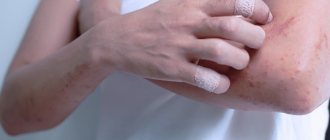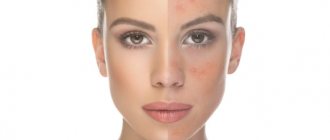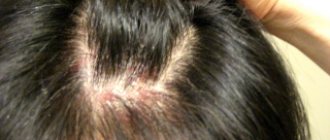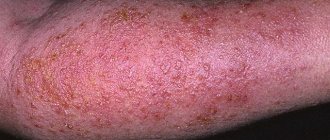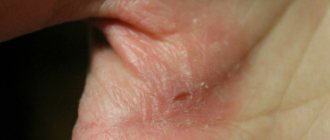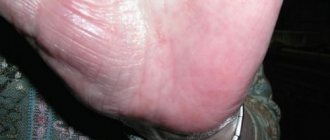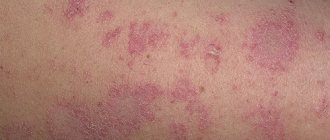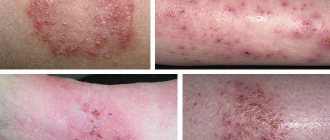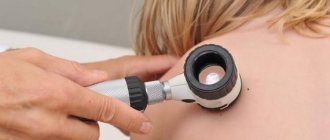Nervous eczema today occupies one of the leading places in terms of frequency of manifestations among other types of this disease. Eczema is a chronic, relapsing skin disease. The manifestations of dermatitis are very varied, but are accompanied by severe itching, burning, pain, a feeling of skin tightness, discomfort, and skin rashes.
Due to frequent exacerbations, changes occur in the subcutaneous epidermis and, in the affected areas, the skin becomes rough, flaky with a changed shade. This skin disease is so unpleasant and interferes with normal human life that scientists around the world have repeatedly conducted research into the cause of its occurrence.
Unfortunately, the causes of dermatitis are not fully understood, and medical workers state the fact that complex treatment (diet, healthy lifestyle, drug therapy, physical therapy) can only suppress the inflammatory process, bringing the disease into stable long-term remission.
Many studies conducted to identify the cause of eczema prove that the psychological factor plays an important role in the development of the disease. The disease in this case is diagnosed as nervous eczema, which indicates that eczema and psychosomatics are closely related.
Of course, consultations with a psychotherapist cannot guarantee recovery from this illness and do not replace complex treatment. After all, it is known that eczema is a multivalent disease, in the pathogenesis of which, in addition to psychological reasons, a huge role is played by the occurrence of a failure of neurohumoral and immune regulation, increased sensitization of the body, exposure to environmental factors (food, chemical allergens, bacteria, fungi), and the presence of chronic foci of infection with concomitant diseases of the patient. But it is worth noting that visiting a psychotherapist at the stage of exacerbation, identifying psychosomatic causes, and canceling a hidden stress factor significantly improves the patient’s condition and accelerates the process of convalescence.
Causes of psycho-emotional disorders
Not the least important role among these reasons is played by the psycho-emotional state of the patient.
The psychosomatics of eczema, that is, the dependence of the clinical manifestations of the disease on the psychological state of the patient, is a fact confirmed by numerous examples. The reasons contributing to the development of eczema in this case may be the following:
- A state of stress caused by anger, anxiety, irritability, fear. Situations characterized by these emotions can be caused by work-related and everyday situations, and family relationships. In this case, an emotional outburst can develop acutely or accumulate over a certain period of time;
- Overwork, excessive physical activity, and insufficient time for sleep lead to the development of chronic fatigue syndrome and, as a consequence, the development of skin lesions. This is precisely the mechanism of development of eczema that is most typical during exacerbation of the disease in the postpartum period.
https://www.youtube.com/watch?v=v7KrPJT6zCc
The psychosomatics of eczema on the hands can also be a consequence of a person’s characterological characteristics, his attitude towards himself, his health, and life situations. It’s easier for extroverts in this regard, since they know how to and are ready to pour out accumulated emotions, thereby bringing the cardiovascular, nervous, and endocrine systems back to normal.
In this regard, it is more difficult for introverts and people prone to depression. Their emotional experiences do not find external manifestation and affect the development of pathological conditions. The most typical manifestations of the influence of a psychogenic factor are hypertension, bronchial asthma, and psoriasis.
Symptoms of the disease
According to psychosomatics, eczema begins to manifest itself on the skin only after some kind of mental shock or deterioration in a person’s psychological state. It all starts with unpleasant sensations when touching the skin. External symptoms of the disease are the appearance of redness and rash. They occur in small localized areas - most often on the elbows, arms or legs, but can spread throughout the body.
The rash subsequently causes severe itching. The bubbles that appear on the skin burst, forming crusts, the surface becomes thick and rough.
An accompanying symptom of the disease is lacrimation, but few people pay attention to it.
If you notice any of the listed signs of eczema, you should immediately contact a dermatologist for medical help and visit a psychologist. If this is not done immediately, the disease begins to develop into an acute form, and the itching becomes simply unbearable. Scratching leads to the release of exudate and the formation of dense crusts that do not come off for a very long time.
Looking for reasons
For example, the disease often manifests itself in people who have oppressive bosses who boss around subordinates and who develop eczema from stress. Also, the causes of eczema can be expressed depending on someone, let's say a wife depends on her husband financially. Hand eczema is the birth of new skin on old skin, as an expression of protest and individuality.
The body's reaction to the surrounding situation is most often reflected on the skin. Symptoms such as:
- Rashes on the skin of the arms, legs, face;
- Itching and watery eyes.
At-risk groups
No one is protected from such a disease, but there are certain risk groups where you can quickly acquire the disease:
- People with low self-esteem. Usually at school age the most pressing events take place - first love, separation, quarrels with peers, protests for individuality, etc. If a child has not learned to cope with them and has not acquired the ability to adapt events, this will affect the emotional background in the future.
- Spouses who are dissatisfied with their own family life. If a wife is financially dependent on her husband, she has to live with unwanted relatives, constant scandals, betrayals, etc. Often this disease manifests itself in children who are forced to live in constant fear and tension from their parents’ scandals.
- People having stressful jobs with oppressive bosses. If you are in constant tension, and go to work as if it were an execution, the body will sooner or later fail in the form of skin lesions.
- Women 30-40 years old. Scientists have found that women are more susceptible to this disease. This is due to their increased emotionality, which more often leads females to nervous (stressful) states.
- People who do not get enough sleep suffer from insomnia.
There are many situations in which this type of eczema can occur. The main thing is to understand that you can’t run away from stress, you just need to learn how to respond to it competently.
General strengthening measures
The dependence of the development of eczema on psychogenic factors must be taken into account both for preventive purposes and when prescribing treatment. Any general strengthening measures are very important in this regard:
- light exercise and gymnastics;
- walks in the open air;
- sufficient sleep;
- normalization of work and rest regimes;
- Spa treatment;
- hobbies and any activities that improve your mood.
In cases where these measures are not enough, or during an exacerbation of the disease, patients are prescribed medications that help reduce anxiety, improve mood, and have a calming and hypnotic effect. These drugs include tranquilizers, antipsychotics, and sedatives.
An important role in the treatment of such patients is given to psychotherapeutic measures and acupuncture.
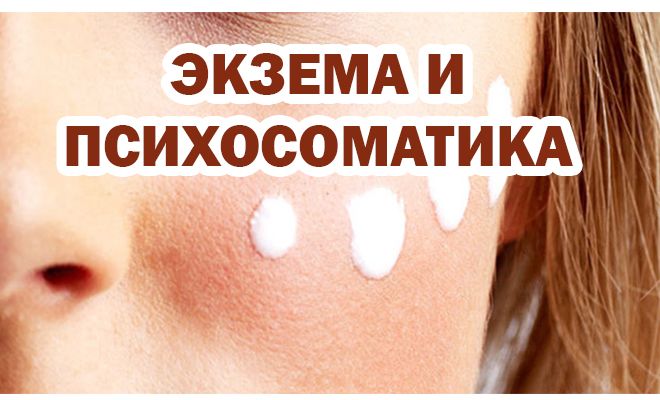
The psychosomatics of eczema, as well as psoriasis and other pathologies characterized by cosmetic disorders, also has the opposite meaning. The skin disease itself, accompanied by a long, severe course and occurring with pronounced changes in visible areas of the skin, is a predisposing factor for the development of depression, the appearance of irritability, poor sleep, and deterioration of the general condition. Thus, the easier the patient feels about his disease, the more effective the treatment will be.
Speaking about the psycho-emotional reasons that contribute to the development of eczema, it is necessary to take into account the fact that, without internal causes and hereditary predisposition, even severe stress cannot lead to the development of this skin pathology. Only the combined influence of various causes, which are not always obvious, leads to the appearance of symptoms of this disease.
Signs of 3rd and 4th degree laryngeal stenosis in children
Collapse is a type of terminal condition, a form of acute vascular insufficiency, characterized by a decrease in vascular tone, an increase in the capacity of the vascular bed, a decrease in the volume of circulating fluid (hypovolemia), and venous return (inflow).
The clinical manifestations of collapse resemble cardiogenic shock, but during collapse there are no signs of heart failure, there is no congestion in the lungs, the neck and peripheral veins are collapsed.
More often develops in children.

The causes of this terminal state are:
Symptoms of stenosing laryngotracheitis of the 1st degree (compensated) in children are:
- moderate condition;
- absence of cyanosis at rest and during exercise;
- inspiratory dyspnea with the participation of accessory muscles with restlessness without the participation of accessory muscles;
- Heart rate exceeds the norm by 5-10%;
- Also a sign of 1st degree stenosis in children is a hoarse voice;
- rough, barking cough.
Symptoms of 2nd degree laryngeal stenosis (subcompensated) in children include:
- absence of cyanosis at rest;
- the appearance of perioral cyanosis with anxiety;
- frequent barking cough;
- inspiratory dyspnea with the participation of accessory muscles;
- participation of reserve muscles during exercise;
- anxiety;
- tachycardia, heart rate increased by 10-15%;
- sweating;
- increased blood pressure.
The main signs of 3rd degree laryngeal stenosis (decompensated) in children are:
- perioral cyanosis at rest and diffuse cyanosis during exercise;
- noisy breathing with severe inspiratory shortness of breath with the participation of auxiliary and reserve muscles;
- restlessness or lethargy;
- tachycardia, heart rate exceeds normal by more than 15%;
- moderate decrease in blood pressure;
- severe pallor;
- “marble pattern” of the skin.
Characteristic signs of 4th degree laryngeal stenosis (asphyxia in children) are:
- the condition is extremely serious;
- consciousness is absent;
- pupils dilated;
- convulsions;
- breathing is shallow, “silent”;
- pale cyanotic skin;
- bradycardia;
- arterial hypotension;
- coma.
Emergency care for acute stenosing laryngotracheitis in children depends on the severity of the child’s condition.
For laryngitis without stenosis, accompanied by an obsessive cough:
- butamirate (Sinekod) or other antitussives;
- distracting procedures;
- inhalation of warm steam at a temperature of 28-32 ° C (in a bathroom with hot water turned on).
Types and forms of eczema, their possibility of transition
There are several types of eczema: true, microbial, occupational, seborrheic and psychosomatic. Typically, psychosomatic manifestations are expressed in itching of the hands, swelling and cyanosis of the skin, and the formation of blisters. In addition, the treatment of hands and other parts of the body is further complicated by the fact that most of them are in the open air, exposed to contact with water and other substances, which makes a quick recovery difficult.
In addition, the causes of atopic eczema originate from rhinitis, urticaria, and food allergies. External causes can also give an impetus, and eczema from the nerves gets a new result. Working with chemicals and various irritants allows you to move from occupational eczema to another form. A person is embarrassed by manifestations on the skin.
How does eczema manifest?
Most often, eczema from nerves manifests itself, like the usual form, with redness, blisters, and unbearable itching. The patient is bothered by rashes on his hands and scratches them. After this, exudate may be released, the wounds become covered with a crust that does not subside for a long time.
The treatment of this disease is not much different from others, unless the doctor is looking for psychological reasons and does not suggest a session with a psychotherapist.
- Ointments based on hormonal agents and antihistamines are used.
- In addition, fatty creams and soothing sedatives are prescribed.
- Vitamins, sorbents to cleanse the body of supposed toxins.
Among hormonal agents, Elokom in the form of an ointment has proven itself to be excellent. It is recommended to complete the prescribed course; treatment should not be interrupted in the middle. Wounds and blisters quickly disappear, the skin becomes clean. Of course, these are all standard means for combating eczema, as with a common skin disease, but we must not forget that the reasons are psychological, and the root of the problems must be sought elsewhere.
The relevance of visiting a psychotherapist
Quite often you can hear the expression: “We are what we think about ourselves.” Deep work on yourself, your thought forms, feelings, acquiring the ability to clearly express your perception of the surrounding reality, a specific situation, achieving a positive result significantly improves your standard of living, taking stress beyond its limits.
That is why it is important to visit a psychotherapist at the first signs of eczema, which include itching, redness of the skin, the appearance of blisters with serous contents, resulting in crusts, cracks in the skin and crusts, ulcers. Treatment of nervous eczema requires an integrated approach. It is necessary to consult a dermatologist, allergist, psychotherapist, physiotherapist, therapist.
It is important to conduct a complete diagnosis of the disease, which will show the stage of the disease and help in selecting adequate therapy. Consultation with an allergist is necessary to identify allergens to which the body reacts with an increased reaction in order to avoid further contact with them. Consultation with a therapist will allow you to sanitize foci of chronic infection.
A psychotherapist will help to understand the patient’s deep-seated psychological problems, which are often on a subconscious level and are not perceived by the patient as a serious factor in disturbances in the body’s functioning. You must be prepared to follow all the doctor’s recommendations. Treatment often includes:
- following a certain diet;
- identifying and eliminating contact with the allergen;
- application of ointments to damaged skin surfaces;
- taking medications that relieve sensitization of the body;
- taking immunomodulators;
- the use of creams and ointments that restore the structure of the skin;
- physiotherapeutic treatment.
Important! Even with a mild form of eczema, you should not self-medicate. This leads either to the transition of the disease to the chronic stage, or to an overdose of dosage forms, which begin to negatively affect the body.
Home Remedies to Fight Eczema
Also, eczema from nerves can be treated at home, using the usual means that are available in almost every family.
- Baths with soda or salt, after which vegetable oil is used;
- Crushed boiled garlic cloves with honey as a lotion;
- Black grapes can also be used as a hand compress;
- Sea buckthorn or its oil helps a lot;
- Emulsion of egg, vinegar and water, 50 ml each.
However, treatment can give a completely different outcome if homeopathy is used. Such a disease will not recur when the diagnosis is made correctly and the true causes of eczema are raised. For example, the mother pays little attention to the child, or a younger child was born in the family, and the eldest does not receive the same love.
Then the child may react to the lack of feelings and emotions with eczema on the hands. Before starting any treatment, you should consult with various specialists and find out which method will be more effective in each specific case. Otherwise, a difficult life and negative emotions will create a surge in psychosomatic diseases against the backdrop of various stressful situations and lack of love.
Severe cardiovascular disease AHF and first aid
Acute heart failure (AHF) is a set of symptoms caused by impaired myocardial contractility, leading to a decrease in blood supply to organs (output failure) and relative stagnation of blood in the venous system and in the pulmonary circulation (inflow failure).

With such a severe disease of the cardiovascular system, fluid accumulates in the interstitium or alveoli of the lungs as a result of plasma transudation from the vessels of the pulmonary circulation, resulting in pulmonary edema.
In myocardial infarction, there are 4 classes of acute heart failure.
Table “Classification of acute heart failure in acute cardiac disease myocardial infarction”:
| Class | Clinical signs | Treatment |
| I | There are no wheezes in the lungs and no III tone | Not required |
| II | Wheezing in the lungs no more than 50% of their surface or III tone | Reducing preload with diuretics |
| III | Crackles in the lungs over more than 50% of their surface, often pulmonary edema | Reduce preload with diuretics; if ineffective, increase cardiac output with non-glycoside inotropic agents |
| IV | Cardiogenic shock | Analgesic, infusion, inotropic therapy |
Table “Correction of the causes of acute heart failure in pathologies of the cardiovascular system”:
| Causes | Correction |
| Heart rhythm disturbances Paroxysms of tachycardia Tachyarrhythmia Atrial fibrillation Severe bradycardia Myocardial infarction Worsening of chronic heart failure Injuries | Restoration of normosystolic heart rate Electropulse, antiarrhythmic therapy Digoxin and/or β-blockers Atropine, electrical pacing Nitrates, pain relief, systemic thrombolysis if indicated Furosemide Pain relief, emergency hospitalization |
Post Views: 843
The influence of psychological causes on the development of eczema
Statistics of skin diseases indicate the fact that nervous eczema is detected more often in women than in men. This is due to the individual characteristics of the female body, increased emotionality and women’s susceptibility to stressful situations.
A feature of psychosomatic eczema that distinguishes it from other types (microbial, atopic, idiopathic, occupational, childhood) is the predominant localization of the disease on the hands and the inclusion of the upper layers of the epidermis in the inflammatory process with frequent relapses. Scientists have long given an affirmative answer to the question of whether psychosomatics and eczema on the hands are related.
American scientists conducted research on this issue, on the basis of which they found that all patients who had psychological problems had a desire to isolate themselves from the world, and as a result, the rapid appearance of eczema on the hands after the emergence of this psychological concept.
The connection between eczema and psychosomatics is clearly traced in the formation of the following factors:
- The occurrence of an imbalance in the physiological reactions of the human body and its psychological adaptation to an unexpected result. Often, patients are psychologically unprepared for any diagnosis and the decline of the body. As a result, a stressful situation arises, leading to an imbalance of neurohumoral regulation.
- The occurrence of a stressful situation is often a trigger for the development of a malfunction in the body at a more subtle level, leading to the development of eczema. The appearance of eczema was often noted precisely in stressful situations, such as the death of a loved one, being drafted into the army, teenage problems with peers, and transitional periods throughout life.
- The presence of a serious pathology of internal organs, when the patient is inclined to be in a state of fear for his own life, also provokes the addition of eczema to the main serious illness. This fact is especially evident in persons with diseases of the cardiovascular and respiratory systems, when there is a threat of coronary and respiratory failure.
- Chronic fatigue and nervous tension provoke an exacerbation of eczema. This factor is especially clearly visible when failure or some kind of disappointment appears in a person’s life. When the factor that led to the stressful situation is eliminated, the patient's condition improves.
A person sometimes gives himself attitudes towards illness when he cannot find harmony of soul or experiences various negative emotions. Therefore, many skin diseases need to be approached from different angles. First of all, find out what worries the patient, what could cause his problem.
What negative attitudes can affect the condition of the skin:
- Anxiety;
- Fear;
- Impatience;
- Guilt;
- Disgust;
- Old grievances;
- Painful self-hypnosis about threats and others.
It is these attitudes that act as the causes of eczema on the hands. Suppressed emotions seem to force a person to free himself, but at the same time he does not feel protected. Psychologists usually say that a person destroys himself, which leads to problems with the skin of his hands.
The cause may be: anxiety and fear, uncleanliness and promiscuity. If a person experiences shame and suppresses stress, then the immune system weakens, so various skin diseases may appear on the hands, feet, and face. Interesting experiments were conducted, and when a person was under anesthesia and hypnosis, there was no allergy.
Epilepsy: clinical picture of the disease and diagnosis of an emergency condition at the prehospital stage
Emergency care for this acute condition is mainly needed for patients who experience single epileptic seizures lasting more than 30 minutes or repeated epileptic seizures without restoration of consciousness, the so-called “status epilepticus”.
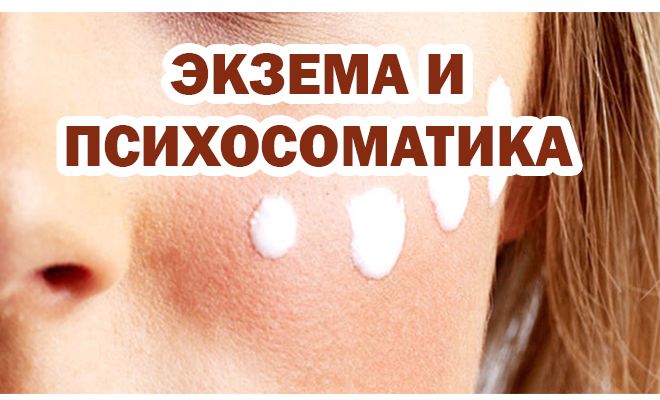
Forms of convulsive seizures:
- Partial (focal, local) - a group of muscles is involved in convulsions while consciousness is preserved.
- Generalized convulsive seizure - consciousness is impaired, convulsions cover the entire body.
Nature of seizures:
Diagnosis of a coma is based on identifying depression of consciousness (Glasgow scale score of 8 points or less) and specific signs of coma of various etiologies.
For the correct etiological diagnosis, identifying the causes and symptoms of coma, it is necessary to clarify the following when collecting anamnesis from those around you:
- the presence of chronic diseases (diabetes mellitus, arterial hypertension, epilepsy, stroke and history of head injury, etc.);
- presence of intoxication and abuse of alcohol or drugs, taking medications (glucocorticoids, thyroid hormones);
- presence of injuries and infections;
- circumstances preceding loss of consciousness (changes in well-being, thirst, polyuria, polydipsia, overheating, coordination problems, alcohol consumption, convulsions);
- rate of development of coma.
During examination and physical examination, identify signs of coma such as:
- the presence of a rash (especially hemorrhagic);
- turgor condition of the skin and eyeballs;
- signs of injury;
- presence of tongue bites;
- change in body temperature (thermometer);
- determination of respiratory rate (with a respiratory rate of less than 10 per minute there is a high risk of respiratory arrest, with a respiratory rate of more than 20 per minute - the condition is severe, with a frequency of more than 30 per minute - the condition is critical);
- auscultation of the lungs (wheezing, whistling, stridor);
- the presence of participation in the act of breathing of auxiliary muscles;
- frequency and filling of the pulse on the radial artery; filling the capillaries: squeeze the fingertip for 5 seconds and release (blood return should occur in less than 2 seconds);
- blood pressure measurement.
Instrumental examination:
- ECG;
- test strips to detect ketonuria, the presence of psychotropics in urine and ethanol in saliva;
- use of analyzers to determine hemoglobin in the blood and glycemic levels.
When establishing the presence of coma, immediate hospitalization in the intensive care unit according to the etiological profile is required. Therapeutic measures are divided into: undifferentiated (for any coma) and specific (depending on the type of coma).
If it is impossible to carry out a differential diagnosis of coma by etiology, it is necessary to carry out undifferentiated emergency therapy and urgently transport the patient to a hospital. Peripheral vein catheterization is mandatory!
The following is a description of the main types of com.
Homeopathy as a solution to the problem
In this case, homeopathy is of great help, where medicinal doses of the drug are offered in minimal quantities. This allows you not to heal the body, but to try to give it an impetus to recover on its own. The trouble is that modern doctors find it difficult to send a patient to a psychotherapist or homeopath, and it is much easier to prescribe him a hormonal ointment so that he will be left alone with his problem for the rest of his life.
If a diagnosis of psychosomatic eczema is made, there is a reason to independently contact other specialists, asking for advice on what to do.
With psychosomatic eczema, it is important to find the causes that destroy a person. It is important to teach him to fight his fears, manage his emotions, and express his feelings. The ability to direct energy in the right direction will help remove eczema from the hands or other parts of the body and make a person more self-confident.
Disease: what to do
It should immediately be noted that modern traditional medicine approaches the practical application of research into the psychosomatic causes of illness. However, the scientists’ justifications are very impressive and indicate that such provoking factors of eczema need to be treated more carefully.
Malfunctions of the immune system quite often occur as a result of experienced stress.
Among all dermatological ailments, the most common is eczema. Its symptoms have a fairly wide range of manifestations.
You can distinguish eczema from other skin diseases by the following signs:
- itching and burning sensation;
- peeling;
- purple-colored weeping;
- lack of clear boundaries of skin lesions;
- low-grade body temperature.
The psychosomatic causes of the development of this disease can be confirmed by the ineffectiveness of drug therapy. Indeed, it is quite possible to suppress eczema on the patient’s hands, face or body with the help of a whole medication complex.
As a rule, the standard treatment regimen consists of:
- Antihistamines.
- Immunomodulators.
- Medicinal ointments and creams.
- Vitamins and microelements.
In case of complicated disease, dermatologists may prescribe more complex medications containing steroids and hormones. As a result, countless medications taken turn out to be pointless. After some time, all the efforts of the doctor and the patient come to naught. Suppressed for a certain time and suppressed by the effects of drugs, eczema appears again and again.
Eczema develops in waves, going through either a chronic phase or a period of exacerbation. It is mainly manifested by thickening of the skin and scales, and the appearance of weeping blisters.
The basis for the development of eczema is created by a psychosomatic cause, but this “trigger mechanism” can be activated by various factors acting both inside the body and from the outside.
If we look at eczema from the perspective of a skin problem that has a psychological source, then it is extremely important to understand what the patient is experiencing. When faced with such a disease, any person feels fear. We are talking about an instinctive concern for one's life.
Subconscious fears and self-doubt do not allow you to find peace of mind and peace of mind. A patient with such a disease does not feel internal strength and remains apathetic to everything around him. He feels that this problem makes it impossible to cope with life in general.
An interesting detail in considering the characteristics of the psychosomatics of eczema can be considered the arguments of American researchers. This reason is due to the desire of the sick person to isolate himself from the environment and the entire outside world. Anything can cause such a desire.
Most often, this happens due to:
- unsatisfactory level of social adaptation;
- death of a loved one;
- betrayal, breakup;
- prolonged nervous tension.
The occurrence of unaesthetic rashes on the skin becomes a significant reason for the final separation from society, as a result of which a person’s psychosomatic health deteriorates significantly.
The Americans' data are fundamentally informed by the results of experiments. The psychotherapeutic treatment of patients with eczema made it possible to increase the percentage of overall recoveries by a third. In addition, as scientists from the United States have noted, the most common causes of eczema are lack of sleep and chronic fatigue. The majority of patients are middle-aged women.
It is not only the psychosomatic causes of this disease that raise doubts among doctors today. Physiological provoking factors also leave many questions open. It is not yet possible to explain the nature of the origin of the pathology with complete certainty.
Eczema in children and adults differs both in location and in the psychological reasons for its occurrence. For example, in a child, eczema most often appears on the cheeks, less often on the hands. The psychosomatics of eczema is explained here very simply. As a rule, childhood experiences that affect the condition of the skin are caused by the actions or inactions of the parents themselves. The most important reason for the appearance of a skin disease in a baby is a violation of direct contact with the mother.
Despite such a young age, the child’s psyche is complex and at the same time vulnerable. The lack of maternal warmth and care literally affects the health of the baby.
In most cases of the appearance of childhood eczema, we are talking about a normal, full-fledged, and most importantly, loving family.
Psychosomatics of children and adults:
- The most common factor in the development of eczema in a child is considered to be the mother's employment. When a baby, waiting for his mother to return from work, sees her tired, not in the mood for games or even conversations, he gets upset. There is often a situation in a family when parents quarrel in front of a child - this is a huge stress for the baby. Thus, the baby does not receive enough maternal warmth and love, and his body begins to suffer, reflecting the problem on the skin.
- In adults, eczema occurs on the hands and feet much more often than on the face. Here psychosomatics is predetermined by dependence on others. Most patients with eczema claimed that they were repeatedly overwhelmed with emotions when talking, for example, with a despotic leader, but any manifestations of feelings always had to be restrained. Constantly hiding your true emotions requires great effort, which means significant damage to the nervous system and psyche. Often the psychosomatic cause of the pathology that occurs in a woman is associated with addiction in the family. Without financial independence, she feels depressed and subordinate.
Undoubtedly, a banal conclusion suggests itself - you need to overcome your fears. But the experiences can come back again. Only deep work on yourself, on your thought forms and feelings will help you not to suffer all your life from your personal perception of the world. It is vitally important to learn how to show your emotions and express feelings, directing the flow of outgoing positive energy in the right direction.
This is the first and main step on the path to recovery. However, you should never forget about the medical recommendations of a dermatologist and neglect traditional drug therapy. Treatment of eczema can only be carried out by a qualified dermatologist. Trying to get rid of the disease on your own, without consulting a specialist, is fraught with more complex consequences.
Naturally, the development of a treatment regimen will depend on the cause of eczema:
- For example, eczema caused by food allergies is treated in most cases by avoiding eating potentially dangerous foods and taking antihistamines.
- If the doctor is almost 100% sure that the cause of eczema is psychosomatic, the main emphasis in treatment will be on eliminating all nervous experiences, eliminating stress factors and neuroses, taking sedatives and sedatives, and much less often, tranquilizers. In more severe cases, the help of a psychotherapist may be needed.
- It is important to take corticosteroids and immunomodulators in the treatment of eczema, the action of which is aimed at strengthening the body's defenses and speedy restoration of the affected areas of the skin. Antiseptic and hormonal agents are prescribed externally to alleviate symptoms.
Today it is still impossible to say for certain about the root causes of eczema. On the face or hands it occurs in a chronic form. It is possible to mitigate the manifestations of a relapse or even delay its onset only with an integrated approach to the search for provoking factors. Psychological and physiological treatment is the best way to treat eczema.
Hurry to start treatment. If after diagnosis it turns out that the psychological causes have already been eliminated and do not require attention, therapy will be standard. In other cases, the intervention of a psychotherapist is highly desirable.
What can be included in the course of treatment:
- Ointments are widely used. Most often these are antihistamines or products made on a hormonal basis.
- Creams – those preparations are used that have a fatty composition and have a calming effect on the skin.
- Vitamins also play an important role, because they allow you to restore the body’s strength and saturate it with useful substances.
The most common hormonal-based remedy for the treatment of eczema is Elokom, used in the form of an ointment.
It is important to follow the dosages prescribed by the doctor and continue treatment for the specified period. If you stop taking the medications, there will be no effect. With proper treatment, the wounds and blisters will soon cease to cover the skin, and the existing ones will gradually disappear. After some time, the epithelial tissue becomes smooth, devoid of any rashes.
Skin problems and constant rashes of unknown nature are a signal from the body that there are parasites in it! They reproduce and defecate inside the human body, while feeding on human flesh.
To fight parasites you need to use a new natural remedy!
Setting a positive outcome
If you follow all the doctor’s instructions correctly, you can forget about the disease for many years, and it will not recur. Perhaps, if the reason at work is to change it, to get away from an environment that irritates and causes negative emotions. If you have problems with your loved ones, try to give each other more love, or, as an adult, simply move to another city.
A person chooses his own destiny and it can be controlled, just like his own self-awareness. The less irritated, upset or depressed a person is, the better and younger he looks. You can take as an example various eastern practitioners who can cure almost any disease without modern drugs, simply by changing a person’s life attitude. Of course, no one talks about incurable diseases, but psychosomatic eczema can easily be overcome.

